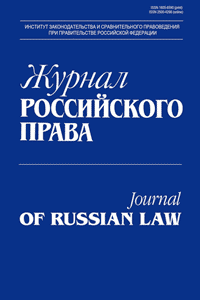In the Russian legislation of the 20th century the terms “contract” and “employment agreement” were used as synonyms. With the adoption of the Labour Code of the Russian Federation this duality has been eliminated. The agreement under the name “Employment Contract (Agreement)” has come to be used as the basis for the emergence of labor relations with employees, and the agreement under the name “Contract (Service Contract)” has come to be used as an agreement with those entering state service institutions. For example, in accordance with the Federal Law of 27.07.2004 No. 79-FZ “On State Civil Service of the Russian Federation” a person entering any state service institution has to sign a formal agreement under the name “contract”. Recently the term “effective contract” has been introduced into the documents of the Russian Government. “Effective contract” is an employment agreement with an employee whereby his duties, responsibilities and the terms of payment are specified. It includes assessment indicators (indices) for measuring the efficiency of the employee’s performance with the view of assigning monetary incentive payments to him depending on the results of his work and on the quality of services being rendered; it also serves as a measure of social support. It is true that the performance of such sectors of economy as healthcare and education, for instance, must be improved and their efficiency increased. Still, an “effective contract” for an employee is legal nonsense. The purpose of the author is to argue that on the basis of Russian labor laws and, above all, of the Labour Code, it is solely “employment agreement” that an employee shall enter, however identical the conceptual categories of “contract” and “employment agreement” might seem. These concepts are not recognized synonyms in Russian law. Hence, there is no need to substitute the name “effective contract” for the name “employment agreement”. Such a renaming will not contribute to the accessibility and better efficiency of education, healthcare and other public sectors of Russian economy. Similarly, it will not help to increase the level of their performance. The author concludes that the current labor legislation contains all the necessary elements to regulate labor relations in public sectors of economy, so no “effective contract” is needed.
Effective contract, employment contract, contract with state employees, the Labour Code of the Russian Federation, employee, employer, labour legislation.
Регулирование трудовых отношений прежде всего основывается на заключении между сторонами трудового договора, что предусмотрено ст. 15, 16 и 56 ТК РФ. Вместе с тем в недавнем прошлом КЗоТ РФ не разграничивал понятийные категории «трудовой договор» и «контракт», что позволяло судить об их синонимичности. Поэтому трудовые правоотношения сторон могли возникать как на основании трудового договора, так и контракта, поскольку наименование соглашения, заключаемого между работником и работодателем, не имело юридического значения и не влияло на правовые последствия, возникающие вследствие заключенного соглашения. Однако с принятием Трудового кодекса РФ эта двойственность была устранена, в связи с чем термин «контракт» был исключен из сферы применения в рамках действия трудового законодательства.
В настоящее время контракт служит основанием для возникновения служебных отношений с государственными служащими. Это происходит в совокупности с иными юридическими фактами (сложный юридический состав): предшествующими его заключению процедурой назначения на должность и соответствующим актом органа государственной власти. Так, в соответствии с ч. 1 ст. 23 Федерального закона от 27 июля 2004 г. № 79-ФЗ «О государственной гражданской службе Российской Федерации» служебный контракт — соглашение между представителем нанимателя и гражданином, поступающим на гражданскую службу, или гражданским служащим о прохождении гражданской службы и замещении должности гражданской службы. Наличие сложного юридического состава при возникновении отношений, основанных на трудовой деятельности, не является редкостью в российском праве. Например, трудовые отношения возникают на основании трудового договора в результате избрания на должность, избрания по конкурсу на замещение соответствующей должности и других юридических фактов согласно ч. 2 ст. 16 ТК РФ.
Однако служебная деятельность может осуществляться не только на основе служебного контракта, но и трудового договора. В качестве примера можно привести служебную деятельность, не входящую в систему государственной службы. Так, согласно п. 6 ст. 16 Федерального закона от 2 марта 2007 г. № 25-ФЗ «О муниципальной службе в Российской Федерации» поступление гражданина на службу осуществляется путем назначения на должность муниципальной службы на условиях трудового договора в соответствии с трудовым законодательством с учетом особенностей, предусмотренных этим Законом.
Как отмечается в специальной юридической литературе, различие терминов «служебный контракт» и «трудовой договор» заключается в стремлении законодателей подчеркнуть специфику и особенности прохождения профессиональной деятельности — государственной службы.
Таким образом, в настоящее время регулирование служебных отношений со служащими осуществляется на основе трудового договора (муниципальные служащие) или контракта (государственные гражданские служащие), которые заключаются как на определенный, так и на неопределенный срок.
1. Abramov N. Slovar´ russkikh sinonimov i skhodnykh po smyslu vyrazheniy. 7-e izd. M., 1999.
2. Bol´shoy tolkovyy slovar´ russkogo yazyka / sost. i gl. red. S. A. Kuznetsov. SPb., 1998.
3. Vorob´ev N. I., Galkin V. A., Mokeev M. M. i dr. Kommentariy k Federal´nomu zakonu ot 27 iyulya 2004 g. № 79-FZ «O gosudarstvennoy grazhdanskoy sluzhbe Rossiyskoy Federatsii» (postateynyy). Dostup iz SPS «Konsul´tantPlyus».
4. Garyachuk I. N. Sluzhebnyy kontrakt na gosudarstvennoy grazhdanskoy sluzhbe Rossiyskoy Federatsii: teoriya i praktika primeneniya / pod red. L. P. Volkovoy. M., 2010.
5. Ershova E. A. Pravovaya priroda sluzhebnykh otnosheniy: voprosy teorii i praktiki. Trudovoe pravo. 2006. № 5.
6. Efremova T. F. Novyy slovar´ russkogo yazyka. Tolkovo-slovoobrazovatel´nyy: v 2 t. 2-e izd. M., 2001. T. 1.
7. Ozhegov S. I., Shvedova N. Yu. Tolkovyy slovar´ russkogo yazyka. M., 1992.
8. Presnyakov M. V., Channov S. E. Administrativno-pravovoe regulirovanie sluzhebnykh otnosheniy: teoriya i praktika / pod red. G. N. Komkovoy. Saratov, 2008.
9. Slovar´ russkikh sinonimov i skhodnykh po smyslu vyrazheniy / pod red. N. Abramova. M., 1999.
10. Starilov Yu. N. Sluzhebnoe pravo. M., 1996.
11. Chikanova L. A. Pravovoe regulirovanie truda gosudarstvennykh sluzhashchikh: perspektivy razvitiya. Zhurnal rossiyskogo prava. 2000. № 3.
12. Shadrina T. Osobennosti oformleniya sluzhebnykh otnosheniy. Kazennye uchrezhdeniya: bukhgalterskiy uchet i nalogooblozhenie. 2012. № 9.








